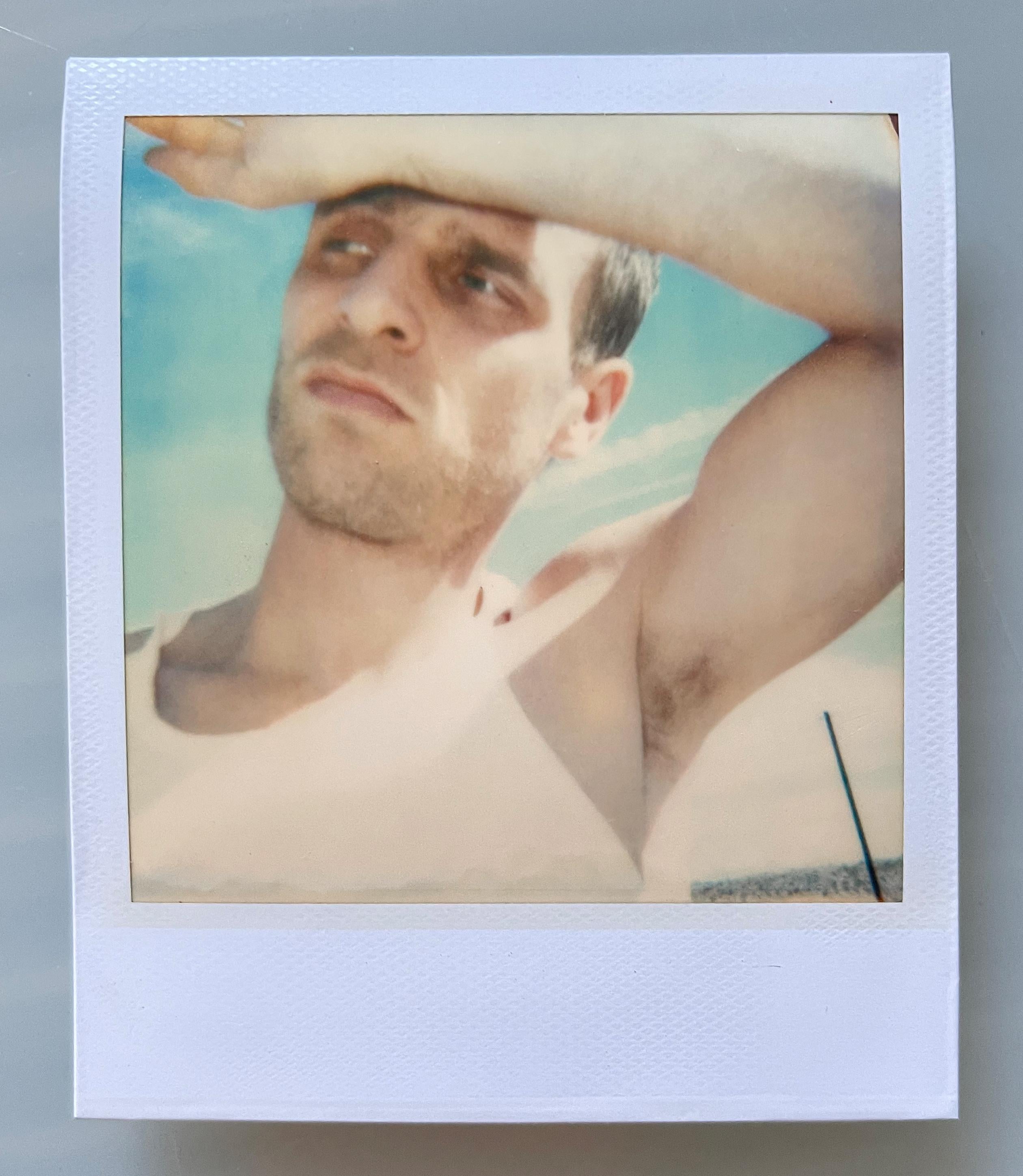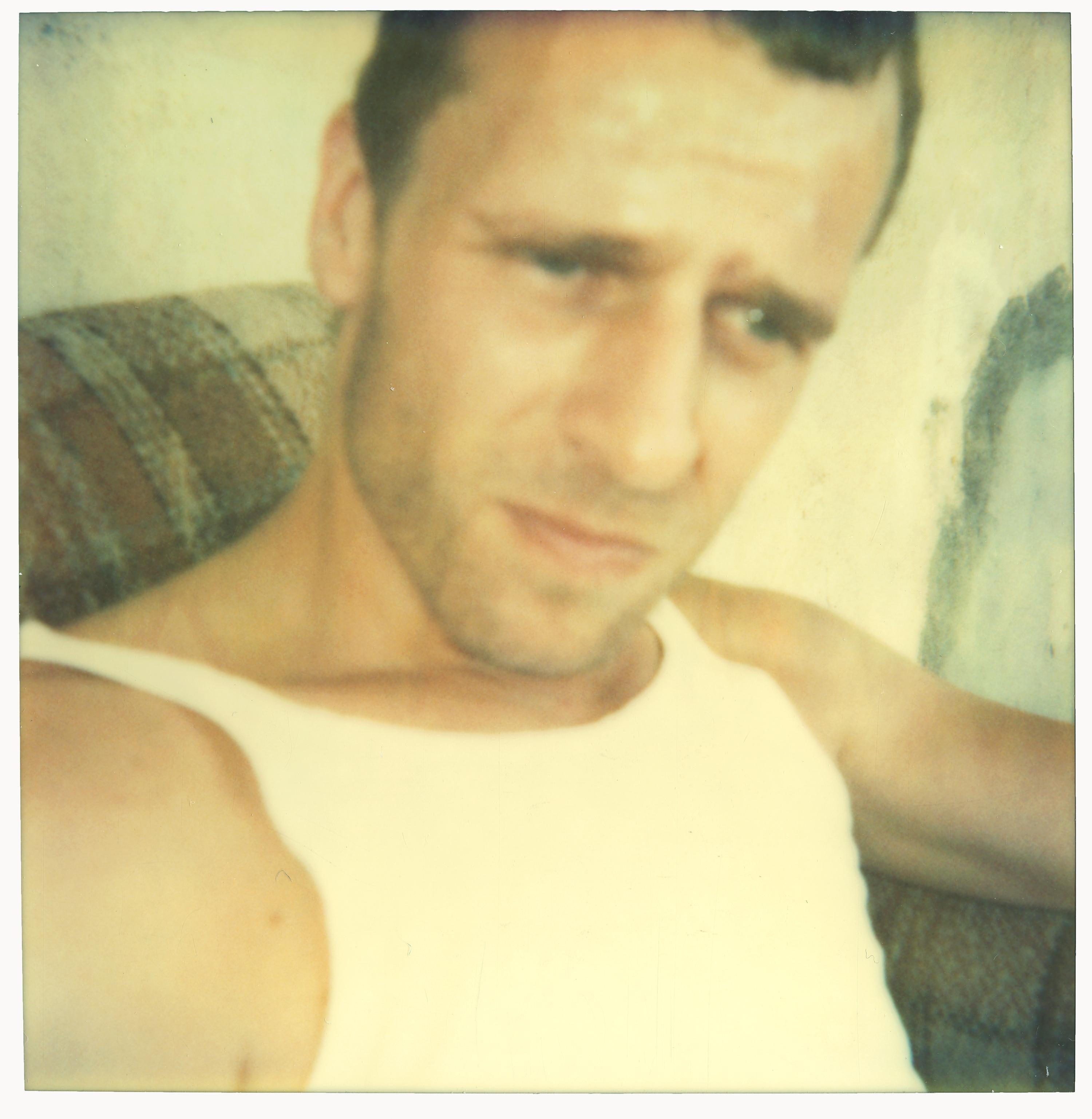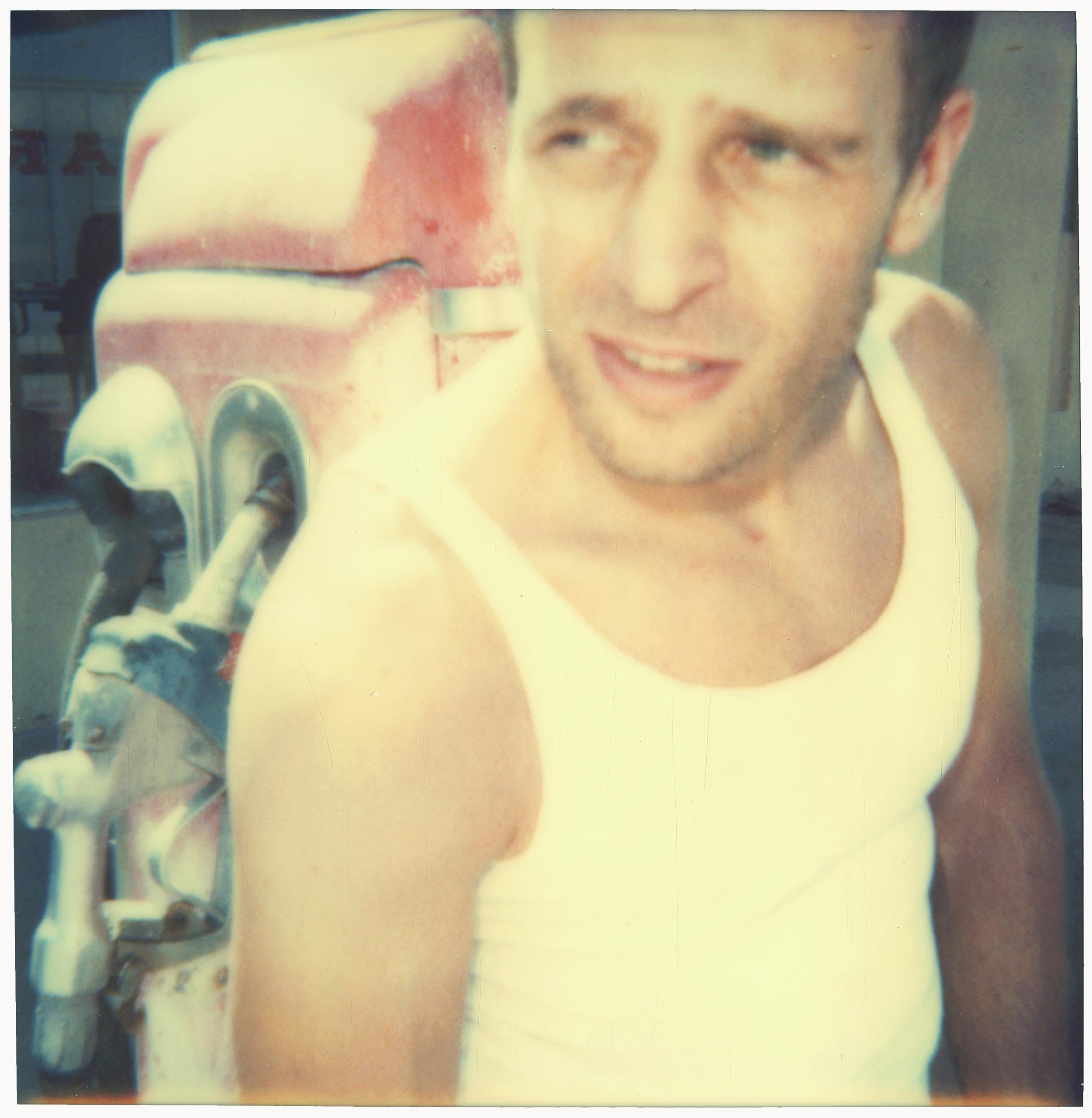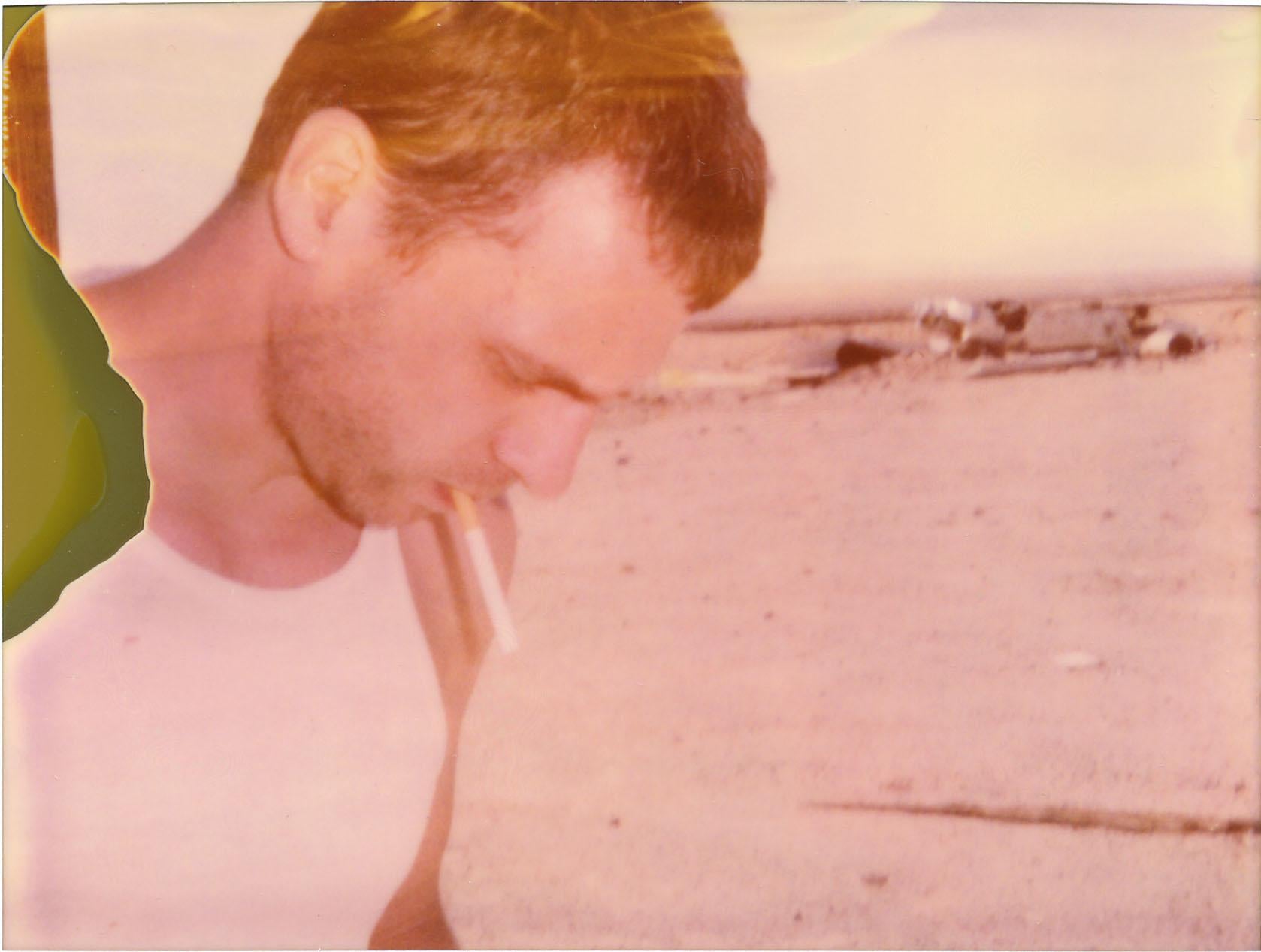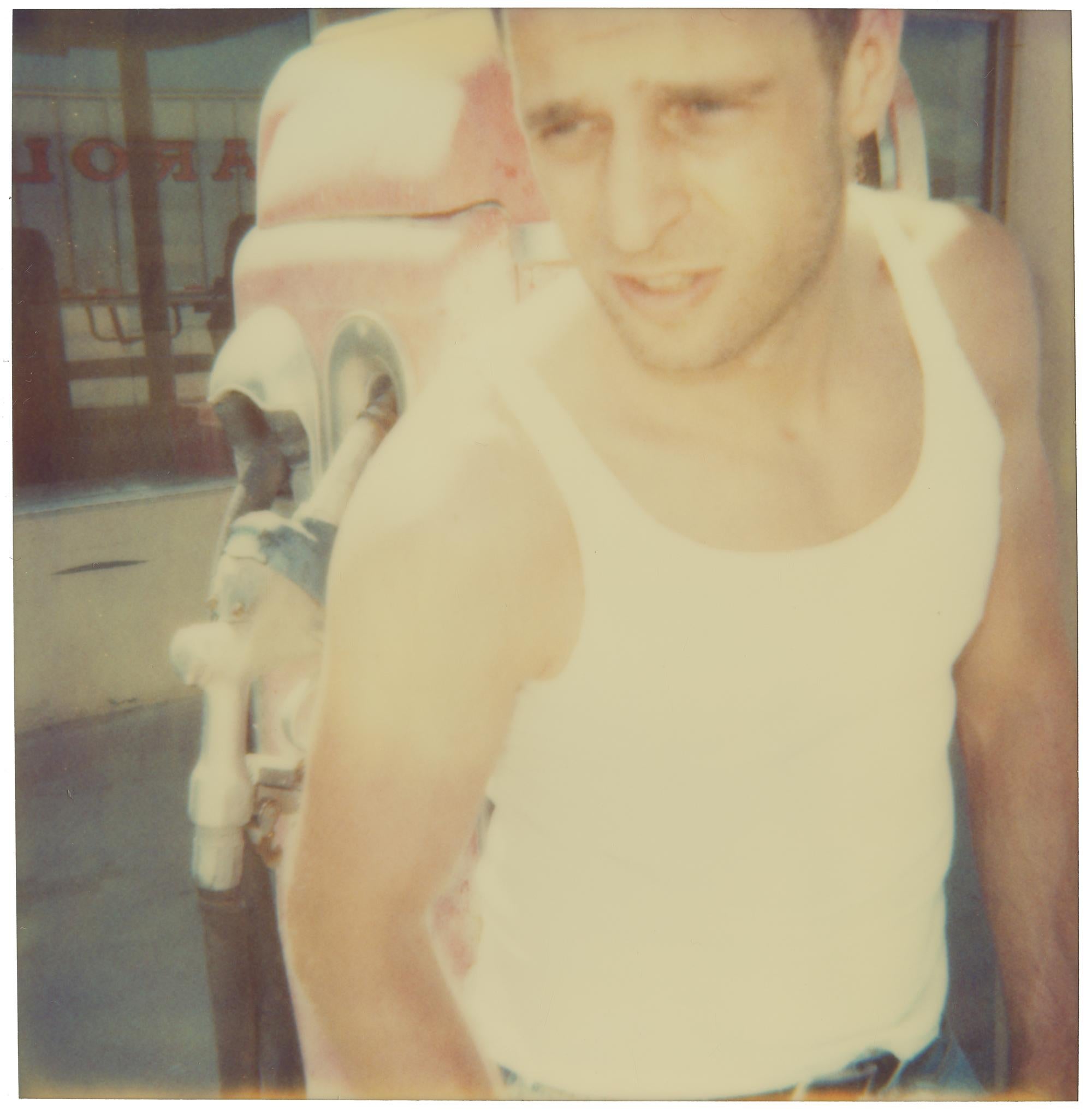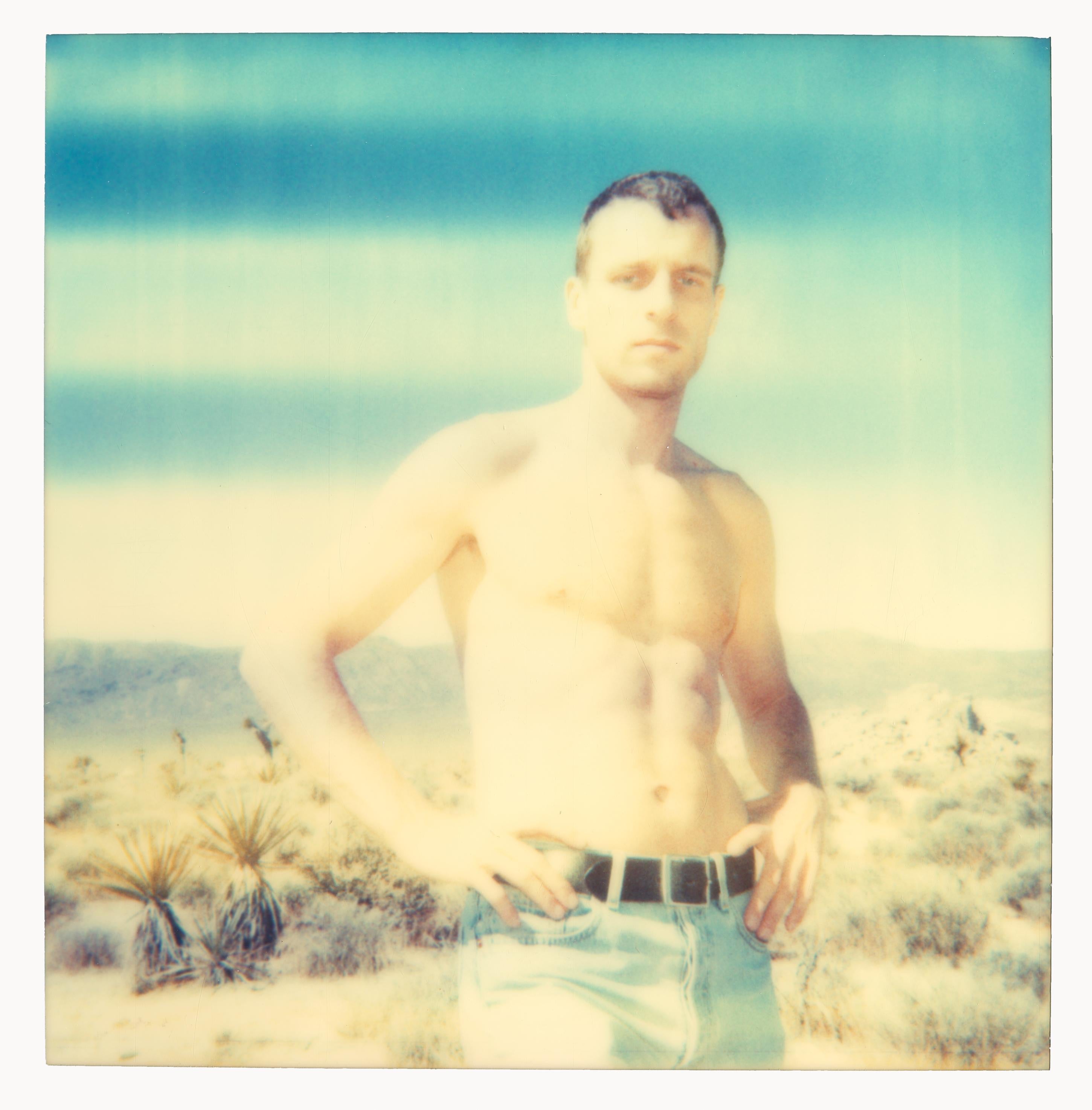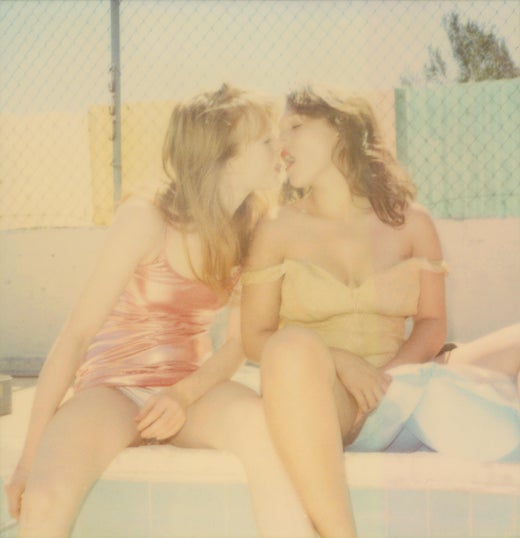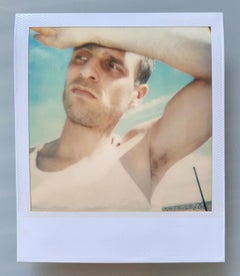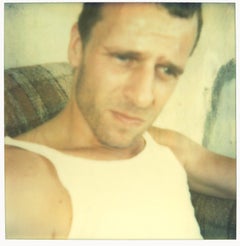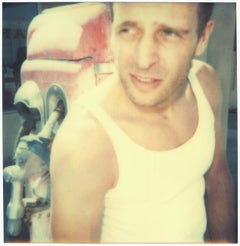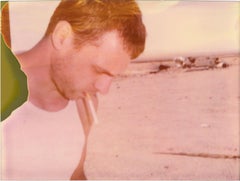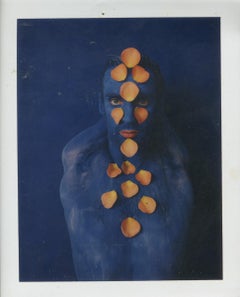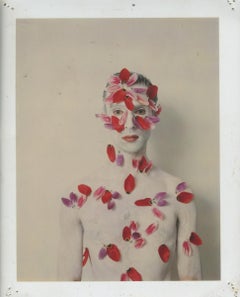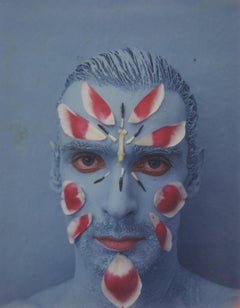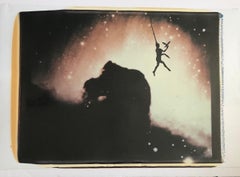Items Similar to Day Worker (American Depression) - Original Polaroid Unique Piece
Want more images or videos?
Request additional images or videos from the seller
1 of 4
Stefanie SchneiderDay Worker (American Depression) - Original Polaroid Unique Piece1999
1999
$1,425.10
£1,054.99
€1,200
CA$1,963.45
A$2,187.56
CHF 1,142.01
MX$26,559.89
NOK 14,354.31
SEK 13,568.31
DKK 9,137.01
About the Item
Day Worker (American Depression) - 1999
Original Polaroid - Unique Piece 1/1.
10.7 x 8.7 cm.
Artist inventory 20663.00.
Signed on back.
Stefanie Schneider's scintillating situations take place in the American West. Situated on the verge of an elusive super-reality, her photographic sequences provide the ambience for loosely woven story lines and a cast of phantasmic characters.
Schneider works with the chemical mutations of expired Polaroid film stock. Chemical explosions of color spreading across the surfaces undermine the photograph's commitment to reality and induce her characters into trance-like dreamscapes. Like flickering sequences of old road movies Schneider's images seem to evaporate before conclusions can be made - their ephemeral reality manifesting in subtle gestures and mysterious motives. Schneider's images refuse to succumb to reality, they keep alive the confusions of dream, desire, fact, and fiction.
Stefanie Schneider received her MFA in Communication Design at the Folkwang Schule Essen, Germany. Her work has been shown at the Museum for Photography, Braunschweig, Museum für Kommunikation, Berlin, the Institut für Neue Medien, Frankfurt, the Nassauischer Kunstverein, Wiesbaden, Kunstverein Bielefeld, Museum für Moderne Kunst Passau, Les Rencontres d'Arles, Foto -Triennale Esslingen.
“It was Stefanie Schneider, who inspired me to start the company THE IMPOSSIBLE PROJECT after seeing her work, which seems to achieve the possible from the impossible, creating the finest of art out of the most basic of mediums and materials. Indeed, after that one day, I was so impressed with her photography that I realized Polaroid film could not be allowed to disappear. Being at the precise moment in time where the world was about to lose Polaroid, I seized the moment and have put all my efforts and passion into saving Polaroid film. For that, I thank Stefanie Schneider almost exclusively, who played a bigger role than anyone in saving this American symbol of photography.”
–Florian Kaps, March 8th 2010
(“Doc” Dr. Florian Kaps, founder of “The Impossible Project”)
The works of Stefanie Schneider evoke Ed Ruscha's obsession with the American experience, the richness of Georgia O'Keefe's deserts and the loneliness of Edward Hopper's haunting paintings. So how exactly did this German photographer become one of the most important artists of the American narrative of the 20th and 21st century?
Stefanie Schneider was born and raised in Germany but lives and works in Southern California. Exploring the American dream and capturing it with Polaroid instant film. Situated on the verge of an elusive super-reality, her photographic sequences provide the ambience for loosely woven story lines and a cast of phantasmic characters that reflect a part of the narrators life told from her perspective. Often about love, communication. sexuality and relationships. Schneider works with the chemical mutations of expired Polaroid film stock. Chemical explosions of color spreading across the surfaces undermine the photograph's commitment to reality and induce her characters into trance-like dreamscapes. Like flickering sequences of old road movies Schneider's images seem to evaporate before conclusions can be made - their ephemeral reality manifesting in subtle gestures and mysterious motives. Schneider's images refuse to succumb to reality, they keep alive the confusions of dream, desire, fact, and fiction yet they also explore the relationship with the medium and the viewer. The wabi-sabi 'ness' of Schneider's work can not be denied or ignored. It's a step of acceptance of 'flaws', gaps and distortions. Missing pieces of the puzzle. The artist flaunts, uses and exposes the unknown using expired Polaroid instant film intentionally. Presents it. What you do with that is up to you. That missing part of the picture is for you to include yourself, you fill it in with yourself. That might be critical that it's there at all, missing and missing the entire point all together or by filling in the unknown with their own imagination. Even their own memories which then integrates the viewer and artist as one with limitless potential.
Stefanie Schneider's new photographic works tell fantastic stories about her adopted Californian home. She seeks out faded American myths and distills a charged reality in a very personal and surprising way. She uses out-of-date Polaroid film, and the blemishes caused by the degenerated film stock, - are included in the composition in a painterly way. Exposure mistakes and low budget movie effects are combined to alienating effect. Everything shimmers and flickers before our eyes. The artist plays with the authentic poetry of the amateur, mixing strangely dreamy staging with random photochemical events. In the 16-part work Frozen, which is characterized by a strangely transcendent mood in the lighting, film-still-like pictorial clusters come together to form a mysterious story, with the artist herself as the lonely protagonist. the aesthetic is reminiscent of early Lynch films. The components of the elliptically choreographed events are scenes from an enchanted, gleaming winter landscape, together with "staged snapshots" of a pale young woman in her underskirts, who radiates the troubled reality of a mirage with her sleep walking presence. The story is presented in the manner of cinematic flashbacks or dream sequences. Stage blood and a knife are used to evoke a crime of passion whose surreal attractiveness is derived from the scenic openness of what is shown. The deliberate use of old instant picture stock establishes in a richly faceted way the ephemeral quality of vulnerability and transience within a reality that is brittle from the outset. The American Stars and Stripes, recently updated as the absolute epitome of a patriotic signifier, is the subject of the 9-part work Primary Colors (2001). Schneider's reassuringly European view, free of undue emotion, presents the Stars and Stripes motif in a strangely alienated form: she shows stills with phases of fluttering violently in the wind, even torn in some cases, and the expired film stock emphasizes the fragility of the icon even more.
FlashART - Sabine Dorothee Lehner (translated from German by Michael Robinson)
- Creator:Stefanie Schneider (1968, German)
- Creation Year:1999
- Dimensions:Height: 4.22 in (10.7 cm)Width: 3.43 in (8.7 cm)Depth: 0.08 in (2 mm)
- Medium:
- Movement & Style:
- Period:
- Condition:
- Gallery Location:Morongo Valley, CA
- Reference Number:1stDibs: LU652310204112
Stefanie Schneider
Stefanie Schneider received her MFA in Communication Design at the Folkwang Schule Essen, Germany. Her work has been shown at the Museum for Photography, Braunschweig, Museum für Kommunikation, Berlin, the Institut für Neue Medien, Frankfurt, the Nassauischer Kunstverein, Wiesbaden, Kunstverein Bielefeld, Museum für Moderne Kunst Passau, Les Rencontres d'Arles, Foto -Triennale Esslingen., Bombay Beach Biennale 2018, 2019.
About the Seller
4.9
Platinum Seller
Premium sellers with a 4.7+ rating and 24-hour response times
Established in 1996
1stDibs seller since 2017
1,036 sales on 1stDibs
Typical response time: 2 hours
- ShippingRetrieving quote...Shipping from: Morongo Valley, CA
- Return Policy
Authenticity Guarantee
In the unlikely event there’s an issue with an item’s authenticity, contact us within 1 year for a full refund. DetailsMoney-Back Guarantee
If your item is not as described, is damaged in transit, or does not arrive, contact us within 7 days for a full refund. Details24-Hour Cancellation
You have a 24-hour grace period in which to reconsider your purchase, with no questions asked.Vetted Professional Sellers
Our world-class sellers must adhere to strict standards for service and quality, maintaining the integrity of our listings.Price-Match Guarantee
If you find that a seller listed the same item for a lower price elsewhere, we’ll match it.Trusted Global Delivery
Our best-in-class carrier network provides specialized shipping options worldwide, including custom delivery.More From This Seller
View AllDay Worker (American Depression) - Original Polaroid Unique Piece
By Stefanie Schneider
Located in Morongo Valley, CA
Day Worker (American Depression) - 1999
Original Polaroid - Unique Piece 1/1.
10.7 x 8.7 cm.
Artist inventory 20662.00.
Signed on back.
Stefanie Schneider’s work is a meditatio...
Category
1990s Contemporary Color Photography
Materials
Polaroid
Day Worker (American Depression) - analog, based on a Polaroid
By Stefanie Schneider
Located in Morongo Valley, CA
Day Worker (American Depression) - 1999
58x57cm,
Edition of 10, plus 2 Artist Proofs.
Analog C-Print, hand-printed by the artist, based on the Polaroid.
Signature Label and Cert...
Category
Early 2000s Contemporary Landscape Photography
Materials
Archival Paper, Photographic Paper, C Print, Color, Polaroid
Desert Center - Polaroid, Contemporary, 21st Century, Color, Portrait
By Stefanie Schneider
Located in Morongo Valley, CA
Desert Center (Stranger than Paradise) - 2000
Edition of 10,
48x46cm.
Archival Print, based on the Polaroid.
Mounted on dibond with matte UV-Protection.
Signature label and Cert...
Category
Early 2000s Contemporary Portrait Photography
Materials
Archival Paper, Photographic Paper, C Print, Color, Polaroid
The Accident - The Getaway (The Last Picture Show) - Polaroid, Contemporary
By Stefanie Schneider
Located in Morongo Valley, CA
The Accident - The Getaway (The Last Picture Show) - 2000
20x25cm,
Edition of 10, plus 2 Artist Proofs.
Archival C-Print, based on the original Polaroid.
Artist Inventory #341.
...
Category
1990s Contemporary Color Photography
Materials
Archival Paper, Photographic Paper, C Print, Color, Polaroid
Desert Center - Polaroid, Contemporary, 21st Century, Color, Portrait
By Stefanie Schneider
Located in Morongo Valley, CA
Desert Center (Stranger than Paradise) - 2000
Edition of 10,
20x20cm.
Archival Print, based on a Polaroid.
Mounted on dibond with matte UV-Protection.
Signature label and Certificate.
Artist Inventory No. 1986.
Published in Stranger than Paradise, Hatje Cantz (monograph)
Stefanie Schneider: A Discovery on Polaroid.
An essay by Eugen Blume
How is it that the photographic works of Stefanie Schneider do not allow anything other than one single association, namely that of America? Because they were taken in America itself? That fact alone would not yet be a compelling argument. Many photographs of America possess a reckless ambivalence which allows even the different country of their own particular creator to seem so similar as to be confused with America itself. Does this ambiguity have something to do with the ongoing, accelerating Americanization of the entire world? Or is it simply connected with our personal clichés which we attribute to a country the size of North America as valid expressions of its very essence, thereupon negligently allowing it not only to dwindle down into any size whatever, but also to expand to a great extent, from Germany by way of Luxembourg right through to Japan?
Now it is certainly true that the figures of Thelma and Louise in the desert do not represent an American reality, not even after their resurrection as Radha and Max in the series 29 Palms from 1999. Strangely enough, it is nature which allows this utterly artificial scene to grow into an American verity. The harsh sunlight in the barren landscape establishes the fundamental tone out of which the women emerge in excessive hysteria from beneath their colored wigs. It is inherently absurd to celebrate the feminine aspect in the middle of a mercilessly inhospitable environment. The image of the two women is a monument of resistance, the meaningful assertion of a lifestyle which stands in contradiction to each and every convention. The pictorial structure and the captured movement along the edge of the format are a means of blending the glaring luminosity with the plot in a manner which perhaps functions successfully only in the “simple” instant technique of the Polaroid. Stefanie Schneider’s pictorial narratives are striking in their formal elegance. She utilizes the chemical faults of the Polaroids, their tendency towards overexposure and double-images as a sovereignly controlled means of artistic design. The defects become, as it were, metaphorical levels which plumb depths lying far beneath the surface. The overly bright colors and schlieren seek out the uncanny; they provide a counterweight to a narration that is deliberately kept superficial. They tell of an invisible strand. They illuminate, in the truest sense of the word, underground processes. Although we are familiar with a series featuring American flags which could not indicate the site of its narrations any more clearly, nevertheless there remains a fundamental doubt as to whether the initially described association with America is identical with that which we deem to be America in a geographical sense.
Although I have in the meantime been in America several times, in both South and North America, deep down I remain uncertain as to whether the New World actually exists. Columbus’ error of continuing to believe, even when having arrived on land, that he was encountering the India which was the actual goal of his journey has burrowed down deep into the European unconscious as a cultural convention. Peter Bichsel’s amusing story “Amerika gibt es nicht” (There is no America) still remains today an undeniable truth: America’s northern half is a film, not a continent. Everything which signifies the U.S.A. – from the Indians, whose most noble savages were invented in Europe, all the way to September 11th and the subsequent war in Iraq, the aliens and the revival of the dinosaurs, the terminators as governors and presidents as actors and vice versa, the electric chairs, the godfather Marlon...
Category
Early 2000s Contemporary Portrait Photography
Materials
Archival Paper, Photographic Paper, C Print, Color, Polaroid
X-Rayed - 20th Century, Polaroid, Contemporary, Color
By Stefanie Schneider
Located in Morongo Valley, CA
X-Rayed (Back in the 80ies) - 1998
48x46cm,
Edition of 10.
Analog C-Print, hand-printed by the artist, based on the Polaroid.
Signature label and Certificate.
Artist Inventory N...
Category
2010s Contemporary Portrait Photography
Materials
Archival Paper, Photographic Paper, C Print, Color, Polaroid
You May Also Like
Untitled Polaroid 21, Unique Polaroid Self Portrait by Dietmar Busse
By Dietmar Busse
Located in New York, NY
This is a unique polaroid photograph by Dietmar Busse.
Untitled Polaroid 21
2001
Signed and numbered in black ink, verso
Polaroid (Unique)
5 x 4 inches, image
Contact gallery fo...
Category
Early 2000s Contemporary Photography
Materials
Polaroid
Untitled Polaroid 23, Unique Self Portrait Photograph by Dietmar Busse
By Dietmar Busse
Located in New York, NY
Untitled Polaroid 23, Unique Self Portrait Photograph by Dietmar Busse.
2001
Signed and dated in black ink, verso
Polaroid (Unique)
5 x 4 inches, image
Contact gallery for price.
Category
Early 2000s Contemporary Photography
Materials
Polaroid
Untitled Polaroid 24, Unique Polaroid Self Portrait Photograph by Dietmar Busse
By Dietmar Busse
Located in New York, NY
Untitled Polaroid 24, Unique Polaroid Self Portrait Photograph by Dietmar Busse
Untitled Polaroid 24
2001
Signed and dated in black ink, verso
Polaroid (Unique)
5 x 4 inches, ima...
Category
Early 2000s Contemporary Portrait Photography
Materials
Polaroid
Vintage 20X24 Format Polaroid Signed Surrealist Photograph Eve Sonneman Photo
By Eve Sonneman
Located in Surfside, FL
This is from a show at Sidney Janis Gallery and is from the estate of Joan Sonnabend.
Eve Sonneman (born in Chicago on 1946) is an American photographer and artist. She did a series ...
Category
1990s Contemporary Color Photography
Materials
Color, Polaroid
"Pola Girls 7" Nude Polaroid Photography - Unique piece by Larsen Sotelo
By Larsen Sotelo
Located in Culver City, CA
"Pola Girls 7" Nude Polaroid Photography - Unique piece by Larsen Sotelo
4.2" x 3.5" inch - including white Polaroid frame
3.1" x 3,1" inch - image area
C...
Category
21st Century and Contemporary Contemporary Nude Photography
Materials
Polaroid
Untitled 17 (Polaroid Transfer of Standing Young Nude Man on Rives BFK)
By Mark Beard
Located in Hudson, NY
image size: 10 x 8 inches
Standing young nude male with dark background
Polaroid Transfer on 22 x 15 inch Rives BFK paper, unframed
signed SM Beard in pencil on bottom right corner....
Category
1990s Contemporary Nude Photography
Materials
Archival Paper, Polaroid
More Ways To Browse
Vintage Worker
Stars And Stripes Vintage
Provocateur Tyler Shields
Used Stage Lights
Schneider Crystal
Nike Fashion
Cyanotype Photograph
Paul Miller
Used Fence Pickets
Woman In Wind
Birkin 30 Hermes 2 Color
Black White Photography Palm Beach
Helen Dzo
Neutra House
Miniature Photography
Slim Aarons Mexico
Robert Mapplethorpe Photograph
American Neon Sign
